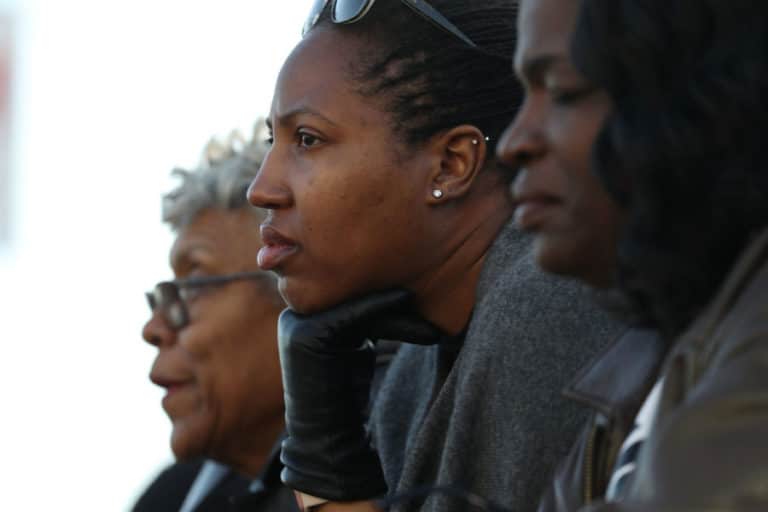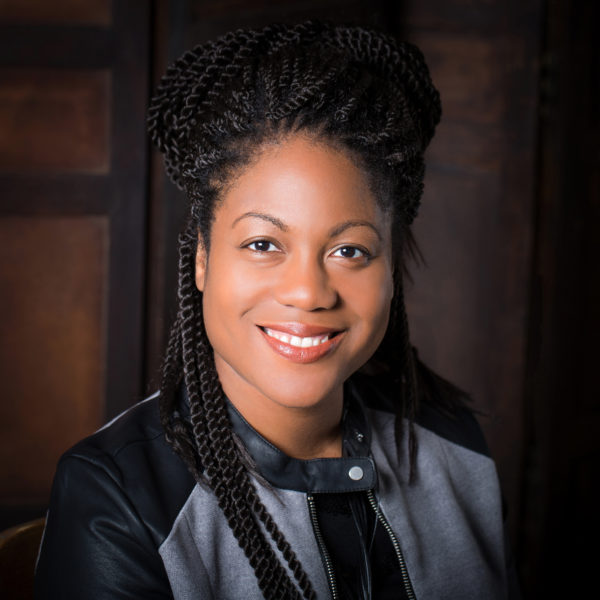
Image by Joe Raedle/Getty Images, © All Rights Reserved.
Standing in the Shadow of Hope
Christians talk about love a lot. It’s one of our favorite words, especially when the topic is race.
If we could just learn to love one another . . .
Love trumps hate . . .
Love someone different from you today . . .
But I have found this love to be largely inconsequential. More often than not, my experience has been that whiteness sees love as a prize it is owed, rather than a moral obligation it must demonstrate. Love, for whiteness, dissolves into a demand for grace, for niceness, for endless patience — to keep everyone feeling comfortable while hearts are being changed. In this way, so-called love dodges any responsibility for action and waits for the great catalytic moment that finally spurs accountability.
I am not interested in love that is aloof. In a love that qualifies the statement, “Black lives matter,” because it is unconvinced this is true. I am not interested in a love that refuses to see systems and structures of injustice, preferring to ask itself only about personal intentions.
I need a love that is troubled by injustice. A love that is provoked to anger when Black folks, including our children, lie dead in the streets. A love that has no tolerance for hate, no excuses for racist decisions, no contentment in the status quo. But I have learned that when I expect this kind of love for my Black female body, it means inviting hopelessness to my doorstep.
When Ta-Nehisi Coates released his landmark book, Between the World and Me, a stunning memoir of Black life in America, much of the talk in both secular and Christian circles revolved around the question of hope. People read his words about America — about its history, about its present, about the realities of living in a Black body—and then demanded hopefulness. It boggles the mind.
For me, Coates’s words contain relief in that they were spoken aloud, in public, with the forcefulness history demands. But talking about race in America is not usually a hopeful experience if you’re Black. It brings no pleasure to speak of the hatred inflicted on our souls, the stories of discrimination and pain and injustices large and small that populate our lives. At the same time, we are barraged by society’s reinforcement that we are less than. The persistence of racism in America — individual and societal — is altogether overwhelming. It doesn’t lay the best fertilizer for hope to grow.
So I have learned not to fear the death of hope. I don’t really want to recount all the ways that hope has let me down; it’s so damn painful. But all of this comes with living, with struggling, with believing in the possibility of change. The death of hope gives way to a sadness that heals, to anger that inspires, to a wisdom that empowers me the next time I get to work, pick up my pen, join a march, tell my story.
Each death of hope has been painful and costly. But in the mourning there always rises a new clarity about the world, about the Church, about myself, about God.
I cannot hope in whiteness. I cannot hope in white people or white institutions or white America. I cannot hope in lawmakers or politicians, and I cannot hope even in pastors or ministries or mission statements. I cannot hope in misquoted wisdom from MLK, superficial ethnic heritage celebrations, or love that is aloof. I cannot hope even in myself. I am no one’s savior. The longer this list gets, the more elusive hope becomes.
Shortly after the publication of his book, Ta-Nehisi Coates was asked if he had reason to hope that racism in America will one day change. He responded:
“Slavery in this country was 250 years. What that means is that there were African Americans who were born in this country in 1750/1760 and if they looked backwards their parents were slaves. Their grandparents were slaves. Their great grandparents were slaves. If they looked forward, their children would be slaves. Their grandchildren would be slaves. And possibly, their great grandchildren will be slaves. There was no real hope within their individual life span of ending enslavement — the most brutal form of degradation in this country’s history. There was nothing in their life that said, ‘This will end in my lifetime. I will see the end of this.’ And they struggled. And they resisted.”
This is the shadow of hope. Knowing that we may never see the realization of our dreams, and yet still showing up. I do not believe that I or my children or my grandchildren will live in an America that has achieved racial equality. And so I stand in the legacy of all that Black Americans have already accomplished — in their resistance, in their teachings, in their voices, in their faith — and I work toward a world unseen, currently unimaginable. I look at the present — police brutality, racial disparities, backlash against being “politically correct,” hatred for our first Black president, the gutting of the Voting Rights Act, and the election of a chief executive who stoked the fire of racial animosity to win — and I ask myself, Where is your hope, Austin? The answer: It is but a shadow.
This is the cool place from where I demand a love that matters. In this place, I see the sun setting behind me, its light as far away as the stars, and I let the limitations of hope settle over me. I possess not the strength of hope but its weakness, its fragility, its ability to die. Because I must demand anyway. It is my birthright. It is the culmination of everything my ancestors endured, of all that my parents taught me, of the Blackness that rescued me. How dare I consider surrender simply because I want the warmth of the sun? This warmth has not been promised to me. My faith does not require it.
Adapted from I’M STILL HERE: Black Dignity in a World Made for Whiteness © 2018 by Austin Channing Brown. Published by Convergent, an imprint of the Crown Publishing Group, a division of Penguin Random House LLC.

Share your reflection